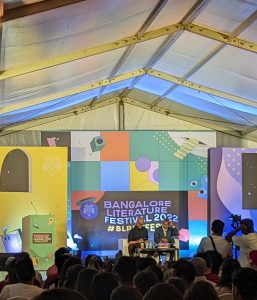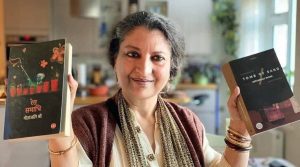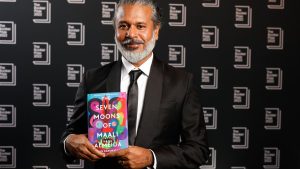
Jottings from Bangalore lit fest: talking samadhi and the after-life

When the 2022 International Booker Prize winner, Geetanjali Shree, was being interviewed on stage, her interviewer gingerly turned to the audience to ask if their conversation could be held in Hindi. Immediately, the packed audience at the 11th edition of Bangalore Literary Festival at the Lalit Ashok Hotel in Bengaluru, responded positively and cheered her on, ‘sure, why not?’ To which, Shree, who talks tough most of the time, said in a pleasant tone, “And, this is south India. Some people will be happy to hear this.” No hard guesses on who that “some people” are!
This lit fest may not be as posh and swish or massive like the Jaipur one, (Bengaluru lit fest can however boast of author Sudha Murty, especially after Rishi Sunak became PM! ), but the BLF is not short of highs and thrills. The easy access to world-famous writers, Booker Prize winners and getting insights into how their minds work, the kind of people they really are outside their books, makes it a blissful space for bibliophiles.
Also, there are book authors on the prowl looking to pitch their books to agents or publishers for a film deal. There are many wannabe writers also closely shadowing authors or publishers hoping to get a patient hearing. In backgrounds with pretty backdrops, there are celebrity poets and fancy journalists posing for selfies and photographs.
At a session on publishing, a man from the audience tells publisher and novelist David Davidar that he has penned a sci-fi novel. When Davidar asks him to name his favourite sci-fi author, the person hums and haws and then he confesses that he doesn’t have a name. To give Davidar credit, who must have met hundreds like him, he kindly told him without batting an eyelid to find one sci-fi writer and read him to know if he has written a good novel.

There are no ghosts or ghouls sitting at your shoulder whispering bad things in your ears urging you to unleash mayhem, like in the book The Seven Moons of Maali Almeida. Instead, the air is charged with positivity. The long wait is over in the evening of the first day, when a pony-tailed, most approachable Shehan Karunatilaka, the 2022 Booker Prize winner came on stage with a beer glass in his hand. This is Bengaluru and this is a lit fest, the most evolved event in recent times, anything goes.
Also read: Book on Chipko Movement wins Kamaladevi Chattopadhyay NIF Book Prize
Pico Iyer: Dissing the digital world
The event kicks off with travel writer Pico Iyer on a nostalgia driven journey dissing the digital world. Isn’t it better to listen to the Rolling Stones at a live concert rather than listening to them on mobiles? Or, why can’t we taste sushi online even after all these technological advancements?
Ironically, Iyer’s four TED talks online have received more than 11 million views so far. But, it is such a delight listening to his elegant narration of his interaction with a taxi-driver in Iran who told him his story or how he saw bookstores full of Steve Jobs’ biographies in a country that hated the USA. That is quintessential Iyer alright.
Iyer is the author of 16 books of fiction and non-fiction, translated into 23 languages, who had his own onstage conversation series, “Speaking with Pico”. His new book, The Half Known Life: In Search of Paradise, will be released in January 2023. After his event, his fans rushed off to catch him behind a desk signing books and to catch a few words with this global soul who is always on the move. Sheila Kumar, a Bengaluru-based author, recounts that there was a long line of people waiting to get Pico Iyer to autograph his books. “But he chatted with each one of us for at least five minutes asking us about ourselves. We were all bowled over by him,” she says.

Writing became her breath
People doing the rounds of literary festivals are full of stories of how the 2022 International Booker Prize winner Geetanjali Shree can be a trifle touchy and hates being put in the dock having to explain her prize winning book, Tomb of Sand. Which according to her, wrote itself.
Like she evocatively explains at the BLF, her writing over the years became “her breath”. She confesses that like Ali Akbar Khan, the sarod player who famously said that he first played the sarod and later the sarod played him, similarly, at first she thought she was writing and directing the novel but eventually the writing directed her.
At the BLF too, Shree sets the tone starting off lamenting why writers have to answer questions all the time or explain themselves. But her interviewers on stage, Arunava Sinha and Anukrti Upadhyay, are made of sterner stuff.
Also read: ‘The Secret of More’ review: This novel explores how Indian cinema came to life
Conversations with translators: Geetanjali Shree
In her interaction, Shree shares with the audience how she was told by a writer friend that her Hindi book Reit Samadhi is her most “untranslatable book”. But, a German translator friend had assured her that a translator’s worth is recognised only when they take up the most impossible task.
For Daisy Rockwell and her French translator, translating Shree’s book was “difficult in an exciting way”. “My French translator and Daisy found it challenging and exciting, and they did a marvellous job. The questions they asked me, the comments they made, the long correspondences we shared, about how much they loved the humour and the cadences in the book. For them, it was not just about translating the story,” shares Shree.
Not read Tomb of Sand
However, Shree confesses that she has not read Tomb of Sand from beginning to end. (people in the audience exclaim in shock ) “Yes, I don’t dare to read my own book once it has come out. It will bother me why I did not stop here, or why I should have said more. Now, the book is completely out of my control and I don’t want to know,” says this perfectionist. And, that probably explains the angry outbursts and the knock-on-the- knuckle retorts.
Arguments over the title
It is well known that Shree was against the English title Tomb of Sand. At BLF, she explains: “Publishers felt that if we use the word Samadhi, it will give the wrong impression. Readers will think of it as something exotic or religious. They wanted it to be mainstream. Tomb to me is a place where a corpse is entombed, but samadhi is a person living forever – attaining Samadhi – it is a completely different, rich philosophical concept. This is not captured in the word tomb at all.” But, Daisy Rockwell had managed to “console” her and told her that she will compensate by using the word Samadhi enough in the book to get the point across to the reader.
Hindi is taught in dull manner
Interestingly, Shree got her real training in Hindi writing when she wrote long letters from her hostel to her mother and received even longer ones back from her. “That was my first training in writing Hindi. I learnt Hindi in an unconventional manner. And in a free way without worrying about grammar. Hindi is disliked because it is taught in a completely unimaginative, limited and dull manner. It should be about daily life, daily exchanges and human interactions – that is why it is so unpopular in certain states,” she says.
Celluloid beckons books
Producer Shobhu Yarlagadda in an interaction on Beyond the Big Screen talks about converting Manu Pillai’s book, Ivory Throne: The Chronicles of the House of Travancore, a sprawling saga on the life of Sethu Lakshmi Bayi, the last – and forgotten – queen of the House of Travancore, into a web series.
The story follows two centuries of internecine conflict, bloodshed and chaos that came to the shores of Kerala along with Vasco da Gama in 1498. According to Yarlagadda, this book lent itself for a web series because of the many characters, the depth and extent of the novel. There are many stories to be told here and we can do justice to them only in a web series, he tells The Federal on the sidelines of his talk.
But what is the rush behind filmmakers signing up authors for film adaptations of their books? “It is easier for us. We have a ready story for the filmmaker, and we don’t have to write one from scratch,” smugly replies Yarlagadda, CEO and co-founder of Arka Mediaworks, a leading film and television production house, which produced S S Rajamouli’s Bahubaali.
“Work on the series is yet to start, we have just bought the rights of the book. It is a long haul,” he admits, but believes that OTT, which offers an additional creative avenue for filmmakers, will continue to hold sway with the audiences and co-exist along with theatres in the future.
The blurb of Raghu Palat and Pushpa Palat’s The Case that Shook the Empire reads thus: Sir Michael O’Dwyer, the former Lieutenant Governor of the Punjab – and architect of the infamous Jallianwala Bagh massacre – had filed a defamation case against Sir Chettur Sankaran Nair for having published a book in which he referred to the atrocities committed by the Raj in Punjab.
The widely-reported trial – one of the longest in history – stunned a world that finally recognised some of the horrors being committed by the British in India. According to the authors, the rights to their book has been purchased by none other than Bollywood moghul Karan Johar and shooting has begun for the film. With the inimitable, never-say-die Bollywood actor Akshay Kumar in the lead.
So, is there a chance that Booker Prize winner Shehan Karunatilaka’s book will also be made into a movie? “I have been approached by Hollywood producers, even for my earlier book Chinaman, but nothing has been finalised,” says Karunatilaka. But will it be easy to convert his recent book, The Seven Moons of Maali Almeida, which has references to bloody wars, dismembered ghosts and fierce-looking ghouls into a film? “Yes, it is difficult but it can be done. I have not signed on the dotted line but there is interest,” Karunatilaka tells The Federal.

Conjuring up a riveting after-life
Karunatilaka’s session “Fresh off the Booker stage” with poet Jeet Thayil is engaging and peppered with laughs. Karunatilaka is most laid-back, and refuses to take the world too seriously. To a question about what research he did to conjure up his highly imaginative and inventive “after-life” in his book, Seven Moons… he says that he saw a lot of horror movies, read philosophical books and about near death experiences. One should most likely experience confusion rather than encounter light, after you die, he says, and he had played on that.
Asked about the “voice” of the slain war photographer Maali in the “second person and present tense”, he says, he was very inspired by Sri Lankan author Carl Muller’s book Jam Fruit Tree.
Set in 1989, Karunatilaka’s book is a searing satire of Sri Lanka torn by civil war, and tells the story of a war photographer who wakes up in the after-life in what seems like a celestial visa office. His dismembered body is sinking in the Beira Lake and he has no idea who killed him. In an environment where death squads, suicide bombers and hired goons are roaming around, he has a long list of suspects. His spirit can only travel to a place where his name is being mentioned.
But even in the after-life, time is running out for Maali. He has seven moons to try and contact the man and woman he loves most and lead them to a hidden cache of photos that will rock Sri Lanka. The book teems with ghouls and ghosts who hover around him in this after-life and Karunatilaka says in his talk that he truly believes there are spirits whispering devilish things in people’s ears egging them on to do evil. That probably explains the chaos and the problems that still beset Sri Lanka, he says.
Employed in an advertising agency, the Booker Prize winner currently lives in Colombo with his family, “his guitars and his unfinished stories”.

